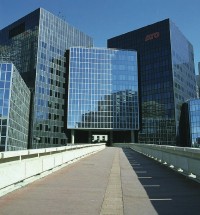Facilities management gets smart

Among the benefits of intelligent building systems are making maintenance intuitive, so that it can be planned and scheduled — rather than considered only when the need arises.
With the rising costs of utilities and increasingly stringent Government regulations on energy, facilities managers need to overcome increasing challenges to ensure their buildings are managed efficiently and cost effectively. RICHARD HIPKISS explains how an intelligent building system can help achieve these goals.With about 40% of all carbon dioxide emissions in the UK coming from buildings, it is not surprising that the Government’s focus is increasingly shifting to how much energy a building consumes in the operational phase. There is also a greater imperative, since the EU emissions figures to the end of 2004 show UK emissions rose by 1.3%. Inefficient management of buildings can needlessly waste valuable energy and will incur penalties and consequences when new regulations, such as Part L2 of the Building Regulations and the European Energy Performance of Buildings Directive, become law.
Practical However, facilities managers are not just influenced by the need to comply with regulations. There is also the need to reduce operating costs from a practical point of view. Evidence shows that operating costs typically amount to almost three times the capital required in acquiring the building. Moreover, these figures do not reflect increases in utility bills, which are reported to be as much as 30%, or maintenance costs, which can also be twice the capital build costs. Investing in systems that will help organisations comply with Government regulations can improve the energy efficiency of buildings and help reduce operational costs. For example, maintenance roles have traditionally been reactive, but with intelligent building-control systems in place, maintenance becomes intuitive and can be planned and scheduled. The advantage is that maintenance can be budgeted, rather than considered only when the need arises — a practice that often results in maintenance works being delayed or even ignored.
Intelligent integration Through the intelligent integration of a building’s services, it is possible for a single system to monitor gas, electricity, water, air and steam. All these utilities can be tracked and monthly reports automatically generated, providing all the information required, whenever it is needed. The days of filling in missing data points due to network errors are over. Similarly, this data can be accessed via a web browser, allowing immediate access to diagnostics and remote device interrogation. Indeed, the integration of building services also has benefits during the initial phases of a building’s infrastructure. Not only can the management and control be regarded holistically, but cable runs and shared networks can reduce installation costs. This requires commissioning management to address the control needs earlier than usual in the specification process, but the advantages of doing so are significant. Remote access to such detailed diagnostics allows the facilities manager to easily track and control all a building’s utilities. It is possible to preset lighting and heating controls via a web browser and to alter these settings should the need arise. For example, if someone is working overtime on a Sunday, the facilities manager can simply turn on the heating and the lighting from a laptop at home, or anywhere else in the world.
Easier reporting Through careful metering and recording of a building’s utilities, reporting becomes easier. With all the information available via a web browser, it is no longer necessary to physically go to each meter and note the readings. Moreover, an intelligent metering system provides real-time data that allows facilities managers to easily identify trends and to mitigate and diagnose problems effectively and efficiently. With the ability to capture events and with greater access to diagnostics, it is simple to identify where, when, and, more importantly, why an unusual reading occurred. For example, it is possible to determine if a power-quality problem lies with the utility supplier or within the building. Such a system could also determine if suppliers have provided equipment that adheres to specified rates. Transients, which can damage electronic equipment, can be pinpointed and power quality issues highlighted. This is particularly important in factories, hospitals, data centres and so forth, where electrical disruptions can lead to unexpected financial loss and can even compromise safety. By effectively monitoring electrical and piped utilities, equipment life can be increased and trend information can be utilised for further cost-saving advantages. It is equally possible to quickly identify areas where energy is being wasted to implement effective energy-saving policies that help buildings comply with regulations. Moreover, empirical studies of metering solutions show an average 5% reduction in utility bills in a diverse range of buildings. But the financial rewards do not stop here. Savings of 2 to 5% can be achieved by better equipment utilisation, and as much as 10% savings potential can be reached by improving the reliability of systems
Greatly benefits Over a building’s lifetime, millions of pounds may be invested in equipment and the energy that runs it. An intelligent building system will greatly benefit facilities managers by helping them comply with regulations and giving them the flexibility and visibility needed to implement other energy and cost-saving policies.
Richard Hipkiss is with the transparent building integrated systems division of Schneider Electric Ltd, Stafford Park 5, Telford, Shropshire TF3 3BD


